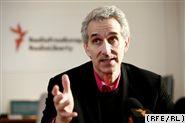While many observers of U.S. foreign policy have in recent years lamented the state of U.S. public diplomacy, Radio Free Europe/Radio Liberty is widely seen as a bright spot amid a dim post-Cold War record of communicating and promoting U.S. values and interests to the world outside the United States. Radio Free Europe/Radio Liberty serves as a "surrogate" free press in countries around the world where such doesn't exist, charged with promoting "democratic values and institutions by disseminating factual information and ideas," as its mission statement puts it. Through the Internet and over the radio, RFE/RL broadcasts in 28 languages in 20 countries. It has a significant presence in Eastern Europe, the Middle East and Central Asia, including in both Iraq and Afghanistan. At the helm of this organization is Jeffrey Gedmin. Before taking over as president of RFE/RL in March 2007, Gedmin served for six years as president of the Aspen Institute in Berlin. For five years before that, he led the American Enterprise Institute-sponsored New Atlantic Initiative, a now-defunct coalition of international institutes, politicians, journalists and business executives aimed at "revitalizing and expanding the Atlantic community of democracies." World Politics Review contributor Juliana Geran Pilon spoke to Gedmin this month in Washington.
WPR: Radio Free Europe/Radio Liberty was praised for having played a role in defeating communism and ending the Cold War. Why should the American taxpayer still support Radio Free Europe/Radio Liberty (RFE/RL) today?

